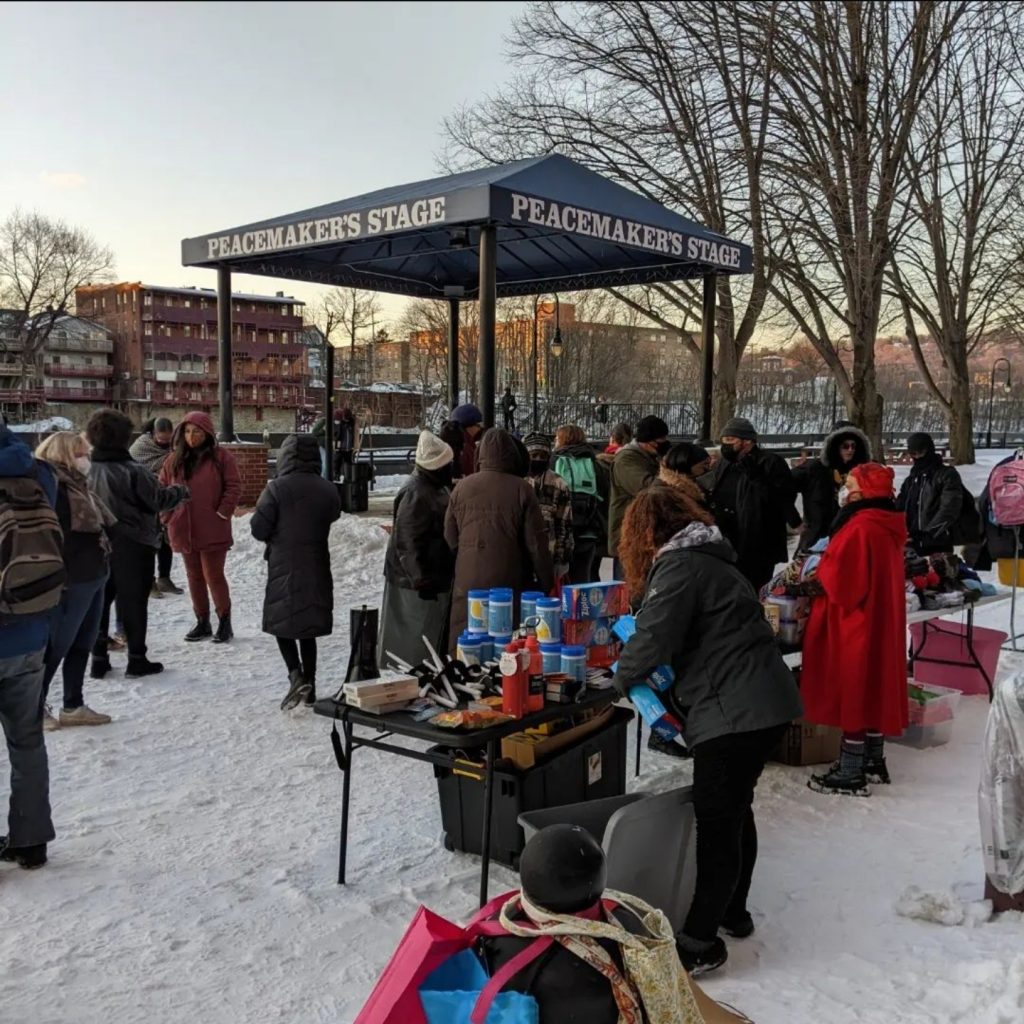
A life recently lost in the community was remembered this past Sunday at the Martin Luther King Jr. Promenade in Downtown Binghamton.
Angela “Angie” Cade, a member of the Binghamton community who passed away in December amid facing housing and health care insecurity, was commemorated in an event jointly hosted by the Stakeholders of Broome County — a housing rights advocacy group — and 100 Black Men of Broome County, an African American-led mentoring organization. The event featured speeches by community organizers and Cade’s family and also had a clothing and food drive in support of the houseless and needy in Binghamton.
Nathan Hotchkiss, ‘12, a member of the Stakeholders of Broome County, explained how the organization found out about Cade’s passing and decided to host the event.
“We learned of Angela’s death through our houseless outreach in Binghamton,” Hotchkiss wrote in an email. “Hearing of this deeply affected our team as it is everything we are working against. We have an obligation to make our community aware of the cruel reality of our housing system. With input from Angela’s family, we created the event to pay tribute to her life, raise awareness of the issues and collect donations to support our houseless community.”
Cade’s story was told by Linda Miranda, ‘17, one of Cade’s sisters. Miranda described how Cade entered the foster care system at a young age and was left without the necessary tools for adulthood.
“The placement in the system was to be temporary, but it turned out that Angela and most of her siblings aged out of the foster care system and, like some of the other children who aged out, turned out on the streets, and some even died not long after being discharged,” Miranda wrote in an email. “The system failed Angela because they didn’t prepare her for real life challenges during her time in the group homes and residential homes for children.”
Myra Cade, another of Angela Cade’s sisters, said she was thankful to see such a crowd come together to commemorate her sister’s memory.
“Thank you people for coming out and making us feel that she did matter, and that she was somebody,” Cade said.
Hotchkiss explained how the Stakeholders of Broome County hoped for the event to be a space for the community to come together and recognize how stories like that of Cade’s come about.
“Tragically, Angela’s story is not unique,” Hotchkiss wrote. “We don’t expect her death to motivate state or local officials to seriously address the housing, substance use and/or mental health crisis currently plaguing our community. Officials are painfully aware and still allow the issues to persist. We hope community members reflect on our roles in perpetuating these circumstances with our various actions and inactions.”
During the event, Salka Valerio, a community organizer for Citizen Action of New York’s Southern Tier chapter, talked about the importance of such community gatherings to work toward solving problems in Binghamton.
“We don’t have a lot of power, we don’t have a lot of money,” Valerio said. “But we created a space here to hold for Angela. People in the community came and donated hats, coats — things to keep people warm, so we can distribute out to people. The community actually really cares, and the more collectively we get together, we organize, we can find ways to fix these collective issues.”
Valerio then said elected officials within the county needed to work harder on providing mental health and housing resources to those in the community who needs it.
“Federally, we got a lot of money to put into communities that were affected by COVID-19,” Valerio said. “That municipality had, you know, they were responsible to put that money into places that would help people that were affected or the community at large clearly. So since housing is a major crisis here, and mental health is a major crisis here, those fundings should have been prioritized for those places.”
Julia Stanley, a community organizer and outreach organizer with the Stakeholders of Broome County and the Binghamton Food Rescue, spoke on the importance of recognizing the houseless as community members.
“We cannot continue to allow people to be trampled,” Stanley said. “We can not continue to stand by. We failed her as a community, and we cannot fail one more person. Houseless people are our community members. They are friends, family and comrades. We are here today to pay respects to Angela, we are here today to provide resources to our unhoused community members who are thankfully still here.”
Hotchkiss said Binghamton University students must increase their awareness of the housing problems in the area and of predatory landlords.
“Students have a lot of power in the area, and there are those eager to siphon and exploit that power for their own personal gain,” Hotchkiss wrote. “Students are often oblivious to how this plays out and impacts the community. In a nutshell, housing that is needed for residents is often reserved and prioritized for students, who come from relatively higher economic backgrounds which means more profits. Student renters should be aware of predatory real estate developers and landlords who are facilitating gentrification and the displacement of Binghamton families.”
Miranda said Cade’s story must be told to try to avoid similar occurrences from happening in the future.
“Someone said that even through all of Angie’s mishaps and her condition, she still found a way of being humane,” Miranda wrote. “She cared for others and loved to be kind even to animals. She loved to crochet, knit and had a green thumb when it came to growing plants. Angie had a lot of love to give, her story needs to be told, that others who have suffered similar experiences would get the help they need before it’s too late.”


